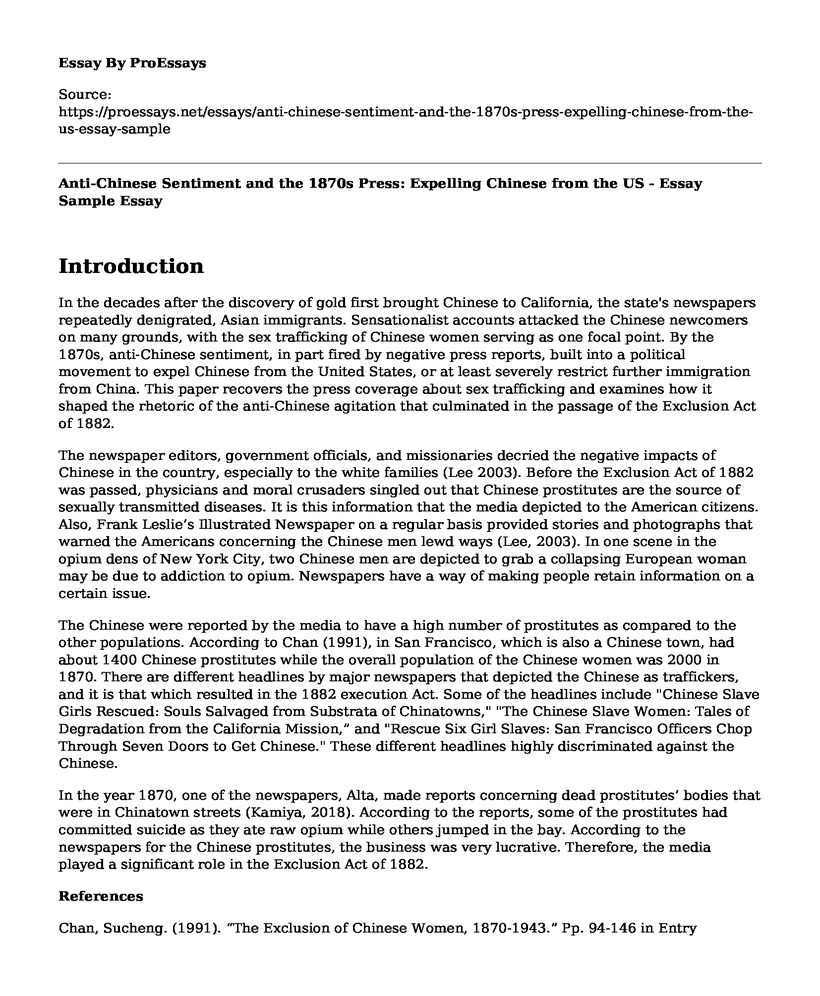Introduction
In the decades after the discovery of gold first brought Chinese to California, the state's newspapers repeatedly denigrated, Asian immigrants. Sensationalist accounts attacked the Chinese newcomers on many grounds, with the sex trafficking of Chinese women serving as one focal point. By the 1870s, anti-Chinese sentiment, in part fired by negative press reports, built into a political movement to expel Chinese from the United States, or at least severely restrict further immigration from China. This paper recovers the press coverage about sex trafficking and examines how it shaped the rhetoric of the anti-Chinese agitation that culminated in the passage of the Exclusion Act of 1882.
The newspaper editors, government officials, and missionaries decried the negative impacts of Chinese in the country, especially to the white families (Lee 2003). Before the Exclusion Act of 1882 was passed, physicians and moral crusaders singled out that Chinese prostitutes are the source of sexually transmitted diseases. It is this information that the media depicted to the American citizens. Also, Frank Leslie’s Illustrated Newspaper on a regular basis provided stories and photographs that warned the Americans concerning the Chinese men lewd ways (Lee, 2003). In one scene in the opium dens of New York City, two Chinese men are depicted to grab a collapsing European woman may be due to addiction to opium. Newspapers have a way of making people retain information on a certain issue.
The Chinese were reported by the media to have a high number of prostitutes as compared to the other populations. According to Chan (1991), in San Francisco, which is also a Chinese town, had about 1400 Chinese prostitutes while the overall population of the Chinese women was 2000 in 1870. There are different headlines by major newspapers that depicted the Chinese as traffickers, and it is that which resulted in the 1882 execution Act. Some of the headlines include "Chinese Slave Girls Rescued: Souls Salvaged from Substrata of Chinatowns," "The Chinese Slave Women: Tales of Degradation from the California Mission,” and "Rescue Six Girl Slaves: San Francisco Officers Chop Through Seven Doors to Get Chinese." These different headlines highly discriminated against the Chinese.
In the year 1870, one of the newspapers, Alta, made reports concerning dead prostitutes’ bodies that were in Chinatown streets (Kamiya, 2018). According to the reports, some of the prostitutes had committed suicide as they ate raw opium while others jumped in the bay. According to the newspapers for the Chinese prostitutes, the business was very lucrative. Therefore, the media played a significant role in the Exclusion Act of 1882.
References
Chan, Sucheng. (1991). “The Exclusion of Chinese Women, 1870-1943.” Pp. 94-146 in Entry
Denied, edited by Sucheng Chan. Philadelphia: Temple University Press.
Kamiya, G. (2018, January 6). The shame of the city: When Chinese sex slaves were trafficked in SF. San Francisco Chronicle. https://www.sfchronicle.com/bayarea/article/Shame-of-the-city-When-Chinese-sex-slaves-were-12477457.php
Lee, C. (2003). Prostitutes and Picture Brides: Chinese and Japanese Immigration, Settlement, and American Nation-Building, 1870-1920.
Cite this page
Anti-Chinese Sentiment and the 1870s Press: Expelling Chinese from the US - Essay Sample. (2023, Aug 09). Retrieved from https://proessays.net/essays/anti-chinese-sentiment-and-the-1870s-press-expelling-chinese-from-the-us-essay-sample
If you are the original author of this essay and no longer wish to have it published on the ProEssays website, please click below to request its removal:
- Essay on Political Science: Ways to Increase Voter Turnout
- Should Socialism as an Economic System Be Preferred to Capitalism?
- How the Failure of the Election System Contributed to Post-election Violence in Kenya's Previous 'Democratic' Elections?
- Essay Example on DRC Soldiers' Hostility and Corruption: Inhumane Acts
- Essay Sample on U.S. Grant: From Cadet to President, A Symbol of Unity
- Essay Example on the 4th Industrial Revolution: Impact on Healthcare Systems
- Gulf War: The US Response, Operation Desert Storm, and Jean Baudrillard's Analysis - Essay Sample







